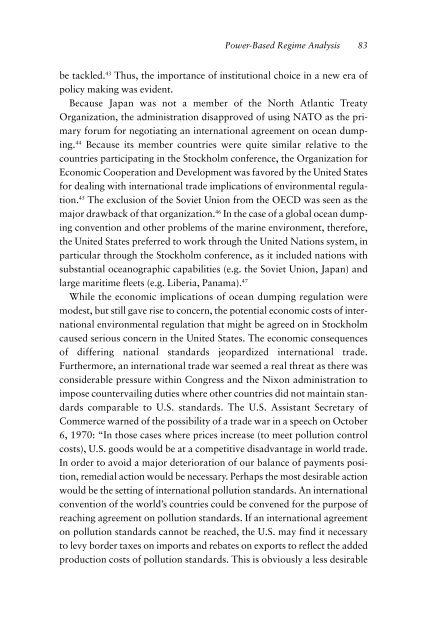Radioactive Waste Disposal at Sea: Public Ideas ... - IMO
Radioactive Waste Disposal at Sea: Public Ideas ... - IMO
Radioactive Waste Disposal at Sea: Public Ideas ... - IMO
You also want an ePaper? Increase the reach of your titles
YUMPU automatically turns print PDFs into web optimized ePapers that Google loves.
Power-Based Regime Analysis 83<br />
be tackled. 43 Thus, the importance of institutional choice in a new era of<br />
policy making was evident.<br />
Because Japan was not a member of the North Atlantic Tre<strong>at</strong>y<br />
Organiz<strong>at</strong>ion, the administr<strong>at</strong>ion disapproved of using NATO as the primary<br />
forum for negoti<strong>at</strong>ing an intern<strong>at</strong>ional agreement on ocean dumping.<br />
44 Because its member countries were quite similar rel<strong>at</strong>ive to the<br />
countries particip<strong>at</strong>ing in the Stockholm conference, the Organiz<strong>at</strong>ion for<br />
Economic Cooper<strong>at</strong>ion and Development was favored by the United St<strong>at</strong>es<br />
for dealing with intern<strong>at</strong>ional trade implic<strong>at</strong>ions of environmental regul<strong>at</strong>ion.<br />
45 The exclusion of the Soviet Union from the OECD was seen as the<br />
major drawback of th<strong>at</strong> organiz<strong>at</strong>ion. 46 In the case of a global ocean dumping<br />
convention and other problems of the marine environment, therefore,<br />
the United St<strong>at</strong>es preferred to work through the United N<strong>at</strong>ions system, in<br />
particular through the Stockholm conference, as it included n<strong>at</strong>ions with<br />
substantial oceanographic capabilities (e.g. the Soviet Union, Japan) and<br />
large maritime fleets (e.g. Liberia, Panama). 47<br />
While the economic implic<strong>at</strong>ions of ocean dumping regul<strong>at</strong>ion were<br />
modest, but still gave rise to concern, the potential economic costs of intern<strong>at</strong>ional<br />
environmental regul<strong>at</strong>ion th<strong>at</strong> might be agreed on in Stockholm<br />
caused serious concern in the United St<strong>at</strong>es. The economic consequences<br />
of differing n<strong>at</strong>ional standards jeopardized intern<strong>at</strong>ional trade.<br />
Furthermore, an intern<strong>at</strong>ional trade war seemed a real thre<strong>at</strong> as there was<br />
considerable pressure within Congress and the Nixon administr<strong>at</strong>ion to<br />
impose countervailing duties where other countries did not maintain standards<br />
comparable to U.S. standards. The U.S. Assistant Secretary of<br />
Commerce warned of the possibility of a trade war in a speech on October<br />
6, 1970: “In those cases where prices increase (to meet pollution control<br />
costs), U.S. goods would be <strong>at</strong> a competitive disadvantage in world trade.<br />
In order to avoid a major deterior<strong>at</strong>ion of our balance of payments position,<br />
remedial action would be necessary. Perhaps the most desirable action<br />
would be the setting of intern<strong>at</strong>ional pollution standards. An intern<strong>at</strong>ional<br />
convention of the world’s countries could be convened for the purpose of<br />
reaching agreement on pollution standards. If an intern<strong>at</strong>ional agreement<br />
on pollution standards cannot be reached, the U.S. may find it necessary<br />
to levy border taxes on imports and reb<strong>at</strong>es on exports to reflect the added<br />
production costs of pollution standards. This is obviously a less desirable

















